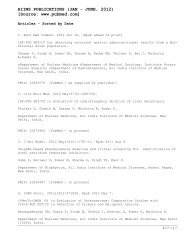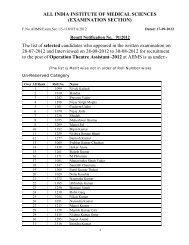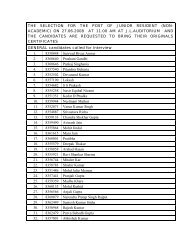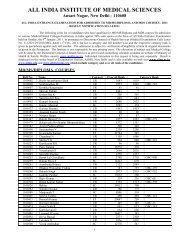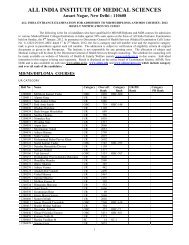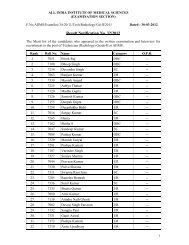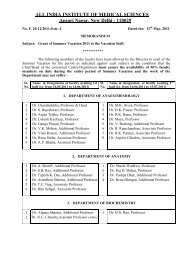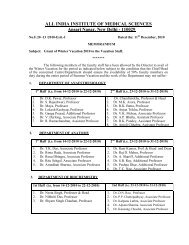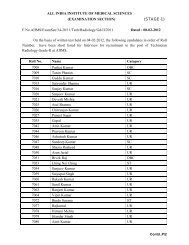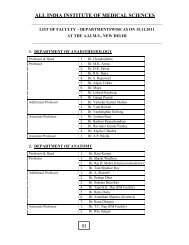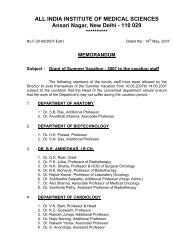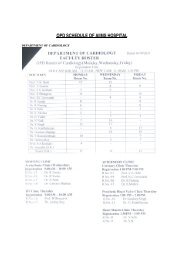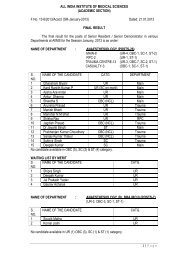Manual for long-term pharmacotherapy - All India Institute of Medical ...
Manual for long-term pharmacotherapy - All India Institute of Medical ...
Manual for long-term pharmacotherapy - All India Institute of Medical ...
You also want an ePaper? Increase the reach of your titles
YUMPU automatically turns print PDFs into web optimized ePapers that Google loves.
Frequently asked questions<br />
Q1. Can I prescribe these medications when patient wants to take medications but not ready to stop<br />
alcohol?<br />
Ans. None <strong>of</strong> these medications require total abstinence from alcohol prior to starting these. If there is heavy<br />
dependence on alcohol, it is always better to treat withdrawal symptoms (detoxification) prior to starting<br />
these medications. Compliance is likely to be better if one stops drinking while on these medications.<br />
These medications do not cause adverse effects similar to that <strong>of</strong> disulfiram (a Disulfiram Ethanol<br />
Reaction) when alcohol is consumed while on these medications.<br />
Q2. When do I say that the medication is not working?<br />
Ans. Build-up the dose to the optimal levels, start non-pharmacological interventions and then wait at least<br />
<strong>for</strong> one month be<strong>for</strong>e declaring that the treatment is not effective. Assess in <strong>term</strong>s <strong>of</strong> decrease in craving,<br />
decrease in frequency <strong>of</strong> drinking, decrease in amount <strong>of</strong> drinking or decrease in episodes <strong>of</strong> heavy<br />
drinking compared to the baseline.<br />
Q3. What is the frequency <strong>of</strong> visits and duration <strong>of</strong> treatment?<br />
Ans. There are no fixed guidelines <strong>for</strong> this. In well motivated patients who have good social support and who<br />
show normal baseline investigations, a good follow-up schedule would be - monthly <strong>for</strong> the first six<br />
months then two monthly <strong>for</strong> the next six months. Encourage the patients to come with their family<br />
members. At the end <strong>of</strong> one year, decision to continue the treatment further may be taken in consultation<br />
with the patient.<br />
Q4. Can family members give these medications to someone who does not want to come to clinic?<br />
Ans. Though, these medications do not cause adverse effects when given clandestinely <strong>for</strong> someone who is<br />
unable to stop drinking, it is not an ethical practice. <strong>All</strong> patients must be seen to assess severity <strong>of</strong><br />
problematic use <strong>of</strong> alcohol, comorbid other psychiatric or medical condition, and to assess the degree <strong>of</strong><br />
motivation. Only then, in consultation and agreement with the patient, the suitable medication must be<br />
chosen. Poorly motivated patients need motivation enhancement therapy.<br />
Q5. Patient is willing <strong>for</strong> total abstinence and is a candidate <strong>for</strong> disulfiram but he reports intense craving<br />
and he fears that he might give into his craving and start drinking leading to the Disulfiram Ethanol<br />
Reaction. What should I do?<br />
Ans. In such cases, with in<strong>for</strong>med consent, start disulfiram and also add an anticraving agent. Such a<br />
combination is likely to have a better outcome. The Disulfiram will help in cognitive arousal to be on<br />
guard, while the anti-craving agent will decrease the craving.<br />
Suggested reading<br />
�Annemans L, Vanoverbeke N, Tecco J, D'Hooghe D (2000). “Economic evaluation <strong>of</strong> campral<br />
(acamprosate) compared with placebo in maintaining abstinence in alcohol-dependent patients.”<br />
European Addiction Research, 6: 71-8.<br />
22



